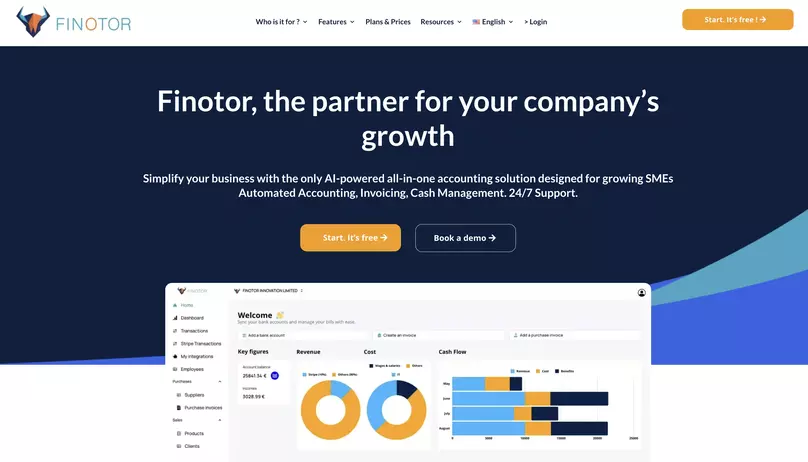Contents
- 1 A Fresh Take on Business Planning
- 2 Challenging the Status Quo
- 3 Conciseness Is Key
- 4 Customer-centric Orientation
- 5 Data-driven Adjustments
- 6 Emphasis on Pivot Versus Persevere
- 7 3.1: Broken Down: The Essential Parts of a Lean Startup Plan
- 8 3.1.1: Value Proposition
- 9 3.1.2: Key Partnerships, Resources, and Activities
- 10 3.1.3: Customer Segments, Channels, and Relationships
- 11 3.1.4: Revenue Streams
- 12 3.2: Gleaning From the Pros
- 13 3.3: Remember: It’s a Guide, Not a Rulebook
- 14 Responding to Constant Change
- 15 Learning and Iteration
- 16 Revision vs. Redesign
- 17 Keeping your Business Agile
- 18 Optimize Your Focus With Finotor
- 19 Make The Lean Startup Business Plan Your Ally
- 20 Take The Leap
Writing a lean startup business plan demands more than a simple desire to launch your business; it requires a meticulous process, passion, a profound vision, and a deep understanding of the nuanced dynamics that set the stage in the entrepreneurial landscape. As an entrepreneur or consultant, embracing these principles could significantly optimize the growth of your business. This article will guide you on how to write a lean startup business plan, providing you with a blueprint to navigate the precarious yet exciting journey of entrepreneurship.
Like a ship sailing to an unfamiliar horizon, a startup should not embark on a journey without a roadmap or a compass. A lean startup business plan serves as both, and drafting one could be the difference between steering your company towards success and getting lost in the turbulent waves of the business world.
Our expertise in Lean Startup Business Plan, groomed over a span of years, can provide you with an arsenal of practical, actionable strategies to effectively write a lean startup business plan. We understand that for startups, time and resources are precious and that’s why we promise to walk with you in this journey—taking you by the hand, from the basic steps right down to the most detailed aspects of drafting a strategic business plan.
Whether your primary goal is to attract investors, get a clear understanding of your business model, or both, the fundamental principle is building a lean startup business plan that breathes life into your vision—and that’s exactly what we’ll delve into in this article. Savvy entrepreneurs and consultants like you can harness this vital tool to streamline operations, anticipate potential pitfalls, and ultimately pave a sure path towards success.
Get ready to embark on this insightful expedition—where we’ll debunk myths, break down complex aspects into understandable bits, and ultimately demystify the art of crafting a compelling lean startup business plan. Let’s add structure to your dream, detail to your strategy, and clarity to your vision; after all, that’s what writing a lean startup business plan is all about.
Join me on this informative exploration as we delve deeper into the vibrant world of startups, and brace up for an exciting entrepreneurial journey with “How to Write a Lean Startup Business Plan” as our compass!
Embracing a Less Traditional Approach
A Fresh Take on Business Planning
Gone are the days when the humble business plan would form a 50-page document, crammed with every imaginable detail concerning your new venture. In an era marked by rapid innovation and increased competition, busy entrepreneurs and savvy consultants alike are turning towards a more efficient alternative – the lean startup business plan.
The lean startup methodology rejects the typical hefty business plan in favor of a short and streamlined one. It favors agility over rigidity, simplicity over complexity, and is perfectly suited for the current fast-paced, ever-changing business landscape. Perhaps the most appealing aspect of this methodology is that it’s designed to save you time and resources, delivering the most crucial information without the excess padding.
Not only are lean startup business plans time-efficient, but their straight-to-the-point format can also be attractive to potential investors. After all, an investor would prefer to see a clear, concise presentation of your business idea rather than wade through an elaborate and potentially confusing proposal.
Challenging the Status Quo
The lean startup plan tells your business story in a compelling yet succinct manner. It captures the essentials: what your company stands for, the issue it aims to solve, how it plans on doing so, and how it will generate income. This is a clear departure from traditional business plans, which can often detail everything from company history to market predictions. By embracing a less traditional approach, you’ll be crafting a document that mirrors the agility and innovation at the heart of your startup, presenting your business in a modern and accessible light.
It’s time to welcome a business planning approach that matches our fast-moving environment. So, get ready to break free from the traditional business plan, simplify your efforts, and embrace the benefits of a lean startup business plan.
In our next segment, we will dive into the distinguishing features of a lean startup business plan, show you its contents and demonstrate why its concise nature can be beneficial for your business’s growth. Stay tuned.
Part 2: Distinguishing Features of a Lean Startup Business Plan
To ensure you’re counting success in clear spikes of growth and profits, it’s essential to grasp the distinct differences between a traditional business plan and a lean startup business plan. Before we delve into the specifics of writing a lean startup business plan, let’s first understand its unique characteristics that are transforming the entrepreneurial landscape and luring the interest of investors.
Conciseness Is Key
A lean startup business plan is designed to be succinct and continual. It strips away the excess, focusing only on key elements that are readily understandable and that bring immediate value. The goal is not to document every little detail, but to provide a clear, guiding path for your startup. This less-is-more approach makes the business plan easier to read and revise, which is a critical factor in the often fast-paced and volatile world of startups.
Customer-centric Orientation
Uniquely, lean startup business plans place customers at the center of your business model. Traditionally, business plans often sideline customers, focusing more on the product or service. In contrast, the lean startup business plan starts by identifying the various customer segments and tailoring offerings and channels to cater to these segments. It’s built around learning about these customers, their needs and wants, then validating these assumptions through hands-on experimentation and data.
Data-driven Adjustments
Another distinguishing feature of a lean startup business plan is its emphasis on iterative learning and building. Lean startup founders view their initial business strategy as a hypothesis, not as a fixed blueprint. By operating in increments and using customer feedback to adjust and validate their assumptions, they avoid waste and grow a business that is directly attuned to market demands.
Emphasis on Pivot Versus Persevere
Consistent with its flexible nature, a lean startup business plan doesn’t strive to rigidly stick to a plan when faced with new learnings or fluctuations in the market. Instead, it encourages a pivot versus persevere approach. When faced with adverse results or feedback, entrepreneurs following the lean methodology are quick to pivot, or change their strategies, rather than clinging to an untenable plan.
Understanding the above distinctions can give you a clear picture of what a lean startup business plan entails. Its concise, customer-centric, and flexible nature can put you light-years ahead in your startup journey. Armed with this knowledge, you’re now ready to delve into the process of crafting a lean startup business plan in the next section. Stay tuned!
Crafting Your Lean Startup Plan
3.1: Broken Down: The Essential Parts of a Lean Startup Plan
Many business plan models may appear dauntingly complex at first glance, but fear not. The beauty of the lean startup business plan is in its straightforward approach. Let’s go step by step to ensure your plan is complete, yet concise.
3.1.1: Value Proposition
The first and arguably most important factor in your lean startup business plan is your value proposition. What sets your product or service apart from the competition? Why should customers choose you? Explain your unique selling proposition in a concise, easy-to-understand way, so your potential investors can see immediately why your startup matters.
3.1.2: Key Partnerships, Resources, and Activities
Next, it’s crucial to detail your key partnerships, resources, and activities. Who will you be working with? What resources are you bringing to the table? Be sure to include what each partner contributes, as this information might significantly add to your startup’s appeal.
3.1.3: Customer Segments, Channels, and Relationships
Customer segments cannot be overlooked. This section helps you identify your target audience and also helps potential investors understand who exactly your products or services will serve. Following this, explain the channels — the paths through which your product reaches the customer — you will use to reach these segments. Also, outline the kind of relationships you wish to build with your customer basis. Will it be personal? Automated? Long-term or short-term?
3.1.4: Revenue Streams
The final part of your lean startup business plan should include your projected revenue streams. Detail where your income will come from and how it will sustain your startup’s activities. Show potential investors that you have a solid financial plan that will guide your business to profitability.
3.2: Gleaning From the Pros
There is a wealth of knowledge and experience available from successful entrepreneurs and lean management consultants who have perfected their lean startup plans. Try to seek out advice and guidance from these individuals whenever possible. They can provide invaluable insights and practical tips to steer your plan in the right direction, ensuring its comprehensiveness without the bulk and complexity.
3.3: Remember: It’s a Guide, Not a Rulebook
One of the key advantages of a lean startup business plan is its flexibility. When writing your plan, remember it’s not set in stone but a living, adaptable guide that can and should be adjusted as your startup grows and evolves. And while it’s important to detail your strategy, it’s equally crucial to stay adaptable to circumstances, ready to update your plan as your entrepreneurial journey unfolds.
Flexibility of a Lean Startup Business Plan
The beauty of a lean startup business plan comes down to its adaptability. Unlike more traditional business plans that can be rigid in their structure, a lean plan is designed to be fluid and responsive to the changing landscape of your startup.
Responding to Constant Change
Entrepreneurship is a dynamic journey. As your venture unfolds, new insights, challenges, opportunities, and changes in market dynamics will inevitably emerge. The luxury of a lean startup business plan is its capability to embrace these shifts. Its structure allows you to make adjustments swiftly, ensuring that your business remains focused, agile, and aligned with your core objectives.
Learning and Iteration
Another major highlight of a lean startup business plan is its focus on learning and iteration. This means that as you test and validate your business assumptions, you’re encouraged to learn from the outcomes and take corrective measures where necessary. Not only does this enable you to improve your strategy continually but it also leads to better decision-making and risk management.
Revision vs. Redesign
With a traditional plan, significant revisions can lead to a complete redesign of the plan, which can be time-consuming and daunting. On the contrary, a lean startup business plan allows for constant revisions without upsetting the whole plan. Because of its minimalist nature, you can easily update any piece of your plan without disturbing the others.
Keeping your Business Agile
The flexibility of a lean startup business plan equips startups to be more resilient in the face of unpredictability. By enabling quick pivots, it allows for faster reactions to market changes, making it easier for your business to stay competitive. On the flip side, a rigid, traditional business plan may cause slower responses, which could potentially harm your business development.
In conclusion, a lean startup business plan not only embraces change but thrives on it. Its inherent flexibility ensures that your plan continues to evolve with your business, providing a living, breathing roadmap that guides your startup towards success. The adaptability that a lean startup business plan offers can be the exact edge your business needs in the unpredictable world of entrepreneurship.
Actionable Steps Forward
Now that you’ve journeyed through the fundamentals of crafting a lean startup business plan and understood its inherent flexibility, it’s time to put this knowledge into action. Aspects such as the value proposition, key partnerships and resources, customer channels and segments, and revenue streams all combine to synthesize a lean business plan that can efficiently contribute in the growth of your entrepreneurial venture. With these insights at your fingertips, kickstart your startup journey with a lean approach that matches your daring spirit with the practical nous of a well-thought-out plan.
Optimize Your Focus With Finotor
Your true value creation lies in focusing on what you do best – managing your startup and developing your side hustle ideas. But between the hustle and the chaos, the last thing you want to be bogged down by is managing your business’s financial aspects and accounting.
Here’s where Finotor (www.finotor.com) steps in. This powerful all-in-one tool is feature-packed to handle all your accounting and financial management needs, so you can keep your energies laser-focused on running your startup and growing it from strength to strength. Designed with entrepreneurs in mind, Finotor not only simplifies your accounting processes but also helps manage your financials seamlessly. And the best part? You can try it out absolutely for free.
Make The Lean Startup Business Plan Your Ally
Remember, a lean startup business plan isn’t a static document. It evolves with your business, accommodating changes, learning from failures, and celebrating successes. It’s your strategic roadmap, aiding you in making data-driven decisions and enabling you to pivot when required.
So, don’t let lengthy traditional plans stifle your startup’s agility. Instead, embrace the lean startup business plan’s versatility, and use it as a dynamic guide that evolves with your business. Whether you’re an entrepreneur at the early stages, a consultant advising startups, or a seasoned business owner, it’s time to make a lean startup business plan your ally in your journey towards growth and success.
Take The Leap
Equipped with your new-found understanding of the lean startup business plan, make the first move. With Finotor at your side managing your accounting, paperwork, and financials, you can focus on realizing your business vision. It’s time to stop dreaming and start doing. Start jotting down your lean startup business plan and infuse your ideas with the well-deserved chance to succeed. So, are you ready to step into the entrepreneurial world dominated by the lean?
Try Finotor for free today and let the lean startup journey begin.
In conclusion, writing a lean startup business plan is a critical task that can significantly shape the journey of entrepreneurs and consultants. This process ultimately empowers you to streamline your ideas, identify key aspects of your business, and provide a solid foundation for any potential investor.
Firstly, a lean startup business plan is more succinct and focuses on the core value proposition of your business. The more detailed and cumbersome traditional business plans, while still valuable, can often be overwhelming. In contrast, your lean business plan should provide a quick, yet effective overview of your business goals, customer segments, channels, revenue streams, and key metrics. This is the perfect tool for modern entrepreneurs who need to be agile and responsive to shifts in the market.
Through the implementation of a lean startup business plan, professionals and consultants can swiftly identify the unique selling propositions of their product or service. A perfectly crafted lean business plan articulates your business concept and unique selling propositions clearly and directly, without unnecessary fluff.
Developing a lean startup business plan further helps entrepreneurs and consultants in their understanding of their target market. Through its emphasis on customer segments and channels, a lean startup business plan paves the way for more effective market research and customer understanding.
Additionally, this approach provides entrepreneurs and consultants a clearer perspective on potential revenue streams. It assists you in projecting and evaluating financial feasibility, which is paramount for understanding what exactly will bring you profit.
Finally, a lean startup business plan draws a clear line between the key metrics and your business success. It provides a framework for setting up, tracking, and reviewing key performance indicators relevant to your specific business model.
So, as an entrepreneur or consultant, learning how to write a lean startup business plan is invaluable. It gives you an advantage by ensuring ongoing clarity and strategic vision, enabling you to not just survive but thrive in the face of unpredictable market conditions.
Remember, the essence of your lean startup business plan should be adaptability and flexibility. Tailor it according to the growing needs and challenges of your startup. Keep updating and refining your plan regularly; it’s an ongoing journey, not a one-time event. Strong plans ultimately drive strong businesses.
Master the art of writing lean startup business plans, and you’ll have a powerful tool in your professional arsenal. Equip yourself with the tools to succeed in the ever-evolving landscape of entrepreneurship, starting with a lean, robust, and insightful business plan.









